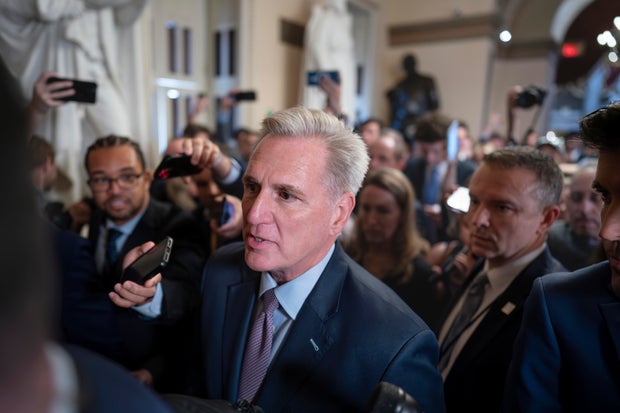Washington — The House on Tuesday voted 216 to 210 to remove California Republican Kevin McCarthy from his position as House speaker, a historic move that comes days after he reached an 11th-hour deal to avert a government shutdown with the help of House Democrats.
The ouster came after Republican Rep. Matt Gaetz acted Monday night to force a vote on a motion to vacate the office of the speaker, following through on a threat he made last week to take the gavel from the California Republican while the threat of a shutdown loomed.
While other speakers throughout history have stepped down after losing the support of their party, McCarthy is the first to be ousted through a vote of the full House in the middle of a congressional term.
“It’s uncharted territory because we’ve never done that in the history of the United States,” Matthew Green, a politics professor at Catholic University, told CBS News.
The unprecedented removal of a speaker in the middle of a congressional session has raised questions as to what will happen next and who will be selected to succeed McCarthy. While the situation is fluid and changing quickly, here’s what we know so far:
What happens when the speaker of the House is removed?
J. Scott Applewhite / AP
The rules of the 118th Congress state that “in the case of a vacancy in the office of speaker, the next member” named on a list submitted by McCarthy to the clerk of the House in January will become speaker pro tempore until a speaker is elected. A House reading clerk announced immediately after the vote that Rep. Patrick McHenry of North Carolina was the first name on McCarthy’s list and therefore was appointed speaker pro tempore.
“Pending such election, the member acting as speaker pro tempore may exercise such authorities of the Office of Speaker as may be necessary and appropriate to that end,” the rules state. The requirement of a list appears to have originated with the 108th Congress that convened in January 2003.
After the speaker pro tempore takes over, “presumably, the next order of business would be to choose a speaker,” Green said. He pointed out that “it’s unlikely the House would continue to operate as usual without a new speaker being selected.”
In his first remarks as speaker pro tempore, McHenry announced that “the office of the speaker was rendered vacant pursuant to the adoption of House Resolution 757,” and added that “prior to proceeding to the election of a speaker, it would be prudent to first recess for the relative caucus and conferences to meet and discuss the path forward.”
He then declared the House in recess.
Who could be the next speaker of the House?
At this point, it’s unclear who can garner enough support to win the gavel. Republicans have a narrow majority of 221 to 212, and McCarthy only managed to become speaker by making a series of concessions to the most conservative members. House Republicans were due to meet Tuesday night to chart their next moves.
The full House votes to elect the speaker. McCarthy could run for speaker again, or Democrats could attempt to build a coalition with Republicans, Green said.
Unlike in January, when the House could not begin its work until a speaker was elected, McHenry will serve in the role temporarily until a new speaker wins the gavel.
Casey Burgat, an assistant professor at George Washington University, said it may be difficult to find a candidate to succeed McCarthy who can garner a consensus of support and who wants the gavel.
“It’s hard enough as a leader, especially with a four-seat majority, but then you start having the infighting here,” Burgat said. “It’s also a pretty terrible job when no one is behind you consistently.”
How long could it take to elect a new speaker?
It’s unclear how soon after McCarty’s ouster the Republican majority will begin the process for electing a successor. In January, when the 118th Congress convened and Republicans took power, it took 15 rounds of voting across four days for McCarthy to secure the support he needed to win the gavel.
His victory followed days of negotiating with the far-right members of the House Republican conference, and in order to win their backing, McCarthy agreed to a number of their demands. Chief among them was lowering the threshold for the motion to vacate, which allowed a single member to call for a vote to remove the speaker.
Like with the effort to oust McCarthy that played out Tuesday, Gaetz was at the center of the dispute over the California Republican’s quest to win the speakership in the first place. He angered some of his Republican colleagues when he voted “present” on the 14th round, blocking McCarthy’s bid and forcing another ballot.
Rep. Tom McClintock, a California Republican, warned that McCarthy’s removal would bring the House to a standstill as lawmakers work to elect a new speaker.
“If this motion carries, the House will be paralyzed,” McClintock said in remarks on the House floor. “We can expect week after week of fruitless ballots while no other business can be conducted.”
Green said while some believe the speaker pro tempore could continue to preside over the House for legislative business, it would be difficult for Republicans to advance legislation without a speaker in place.
“The reality is that the Republicans look to the speaker for all kinds of things, like setting the agenda and negotiating between factions in order to figure out what comes to the floor,” he said. “So without somebody in charge, it’s hard to see the House Republicans being able to bring much to the floor in the first place.”
Caitlin Yilek and Kathryn Watson contributed to this report.
